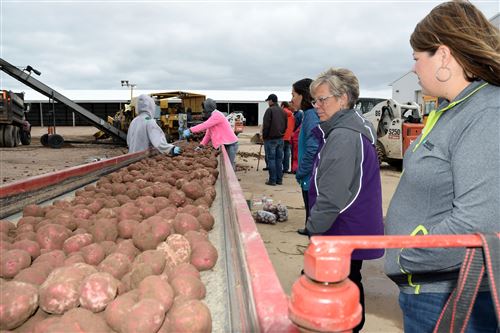
Tour Has All Eyes on Seed Potato Business
Wisconsin’s Central Sands is known for potato crops that are sold fresh and processed as chips and fries, but there is an important growing area in Langlade County that specializes in another type of potato.
“There are about 60,000 acres of potatoes in Wisconsin, and this little Antigo area has about 10,000 acres, and about 8,000 of them are seed potatoes,” said JD Schroeder with Schroeder Brothers Farms, one of about 15 seed potato growers in the county.
Schroeder Brothers hosted visitors in September from Marathon County’s Partnership for Progressive Agriculture to learn more about the process of growing seed potatoes.
Potatoes don’t actually grow from seed, Schroeder told the group. What is called a seed in the potato world is actually a cut piece of a potato with at least one “eye” in it. When planted, that piece produces many more tubers with the same characteristics as the parent plant. The challenge is that potatoes are susceptible to any number of pests, pathogens and problematic weather conditions that can destroy a crop quickly, so seed producers are strictly regulated to be sure they don’t pass diseases along to other growers.
Schroeder’s ancestors settled in what was called New County in 1879. A year later it was renamed Langlade.
“It used to be more dairy cows and just a few acres of potatoes,” said Schroeder, who is part of the fifth of six generations of family on the farm.
Today, Schroeder Brothers — John Thomas (JD’s father), Rob and Pete — along with members of their families, 50 full-time employees and about 50 part-time workers, manage 6,000 to 7,000 acres of crops with about 30 varieties and 2,200 acres of potatoes in the rotation. About 80 percent of the potatoes are sold for seed and the remainder as fresh table potatoes.
Much of the seed stock grown at Schroeder Brothers was initially developed at UW-Madison, which also grows its potatoes for the first two years before they go to seed stock growers like the Schroeders. At Schroeder Brothers, plants are followed through the growing season and officially inspected in the field and as they go on the truck to customers. They must be certified disease-free in order to leave the farm.
“A potato costs a lot more to grow per acre than corn or soybeans, so it ends up being a lot more valuable crop, and you have to go through a lot more effort to keep it healthy,” said Schroeder. “There are hundreds of potato diseases that we are trying to stop.”
When planted in the spring, seed is put down with fertilizer and then fertilized again when soil is hilled up around the growing foliage. Hilling protects the growing tubers from exposure to damaging sunlight and aids drainage. Even with hilling, excess rain this summer drown out 10 to 15 percent of the Schroeders’ crop. Fungal diseases follow hard on the heels of moisture, so regular spraying is necessary, Schroeder said.
Growing potatoes is an expensive enterprise with expensive inputs and expensive equipment. Some fungicides can cost $100 an acre, and a harvester can cost upwards of $800,000. On top of that, sales of fresh potatoes have declined steadily since the 1950s, Schroeder said. Margins are tight.
“Farmers are getting better and better, so yields are going up while consumption is going down,” he said. ”It definitely puts a cap on your price. It’s a little bit of a scary thing right now.”
Still, he sees a strong future for the family business. Both he and a cousin have youngsters that love to visit the farm and ride in the tractors.
“Hopefully it will keep going on for many generations,” Schroeder said. “You’re always trying to be sustainable and limit your soil loss just so that the farm can keep going. Something that started in 1879, you want it to be successful. We just hope people keep eating potatoes.”
The Partnership for Progressive Agriculture is a nonprofit organization that educates, promotes and advocates for diverse and sustainable agriculture. The group also visited Canopy Gardens during the Langlade County tour to learn about growing hydroponic tomatoes.
Source: The Country Today
